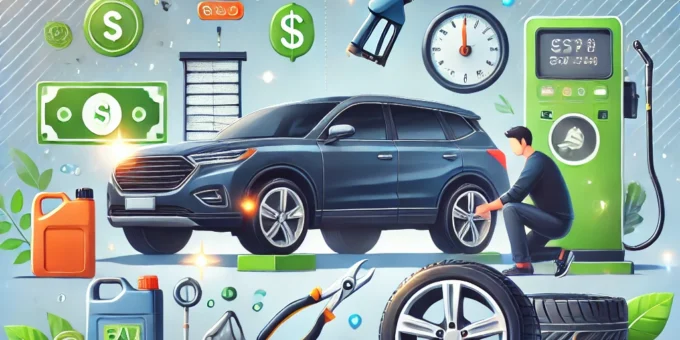
Fuel efficiency is essential for saving money and reducing your carbon footprint. Regular car maintenance not only ensures optimal performance but also enhances your vehicle’s mileage. This guide outlines actionable tips to improve fuel efficiency through consistent care and smart driving practices.
Why Is Fuel Efficiency Important?
- Saves Money: Reduced fuel consumption lowers your overall driving costs.
- Eco-Friendly: Minimizes greenhouse gas emissions.
- Extends Vehicle Life: Proper maintenance reduces strain on engine components.
Key Maintenance Tips to Boost Fuel Efficiency
1. Keep Tires Properly Inflated
- Underinflated tires increase rolling resistance, which reduces mileage.
- Check tire pressure monthly and maintain it at the manufacturer’s recommended PSI.
2. Perform Regular Oil Changes
- Clean oil ensures smooth engine operation and reduces friction.
- Follow the manufacturer’s guidelines for oil type and change intervals.
3. Replace Air Filters as Needed
- Dirty air filters restrict airflow, making the engine work harder.
- Replace filters every 12,000–15,000 miles or as indicated in your car’s manual.
4. Monitor and Replace Spark Plugs
- Faulty spark plugs can lead to incomplete combustion, wasting fuel.
- Inspect and replace spark plugs according to your car’s maintenance schedule.
5. Use the Right Motor Oil
- Use oil with the proper viscosity grade recommended by your manufacturer.
- Opt for synthetic oil if suggested, as it improves engine efficiency.
6. Check and Align Tires
- Misaligned tires cause uneven wear and increase drag.
- Get wheel alignment checked during routine servicing.
Additional Tips for Better Mileage
1. Avoid Excess Weight
- Remove unnecessary items from the trunk or back seat.
- Avoid roof racks unless needed, as they create aerodynamic drag.
2. Maintain Optimal Speed
- Drive at steady speeds and avoid rapid acceleration or braking.
- Use cruise control on highways to maintain efficiency.
3. Service the Fuel System
- Clean fuel injectors periodically to ensure proper fuel delivery.
- Use quality fuel to prevent deposits and maintain engine health.
4. Check the Exhaust System
- Ensure there are no blockages or leaks that affect engine performance.
- A properly functioning exhaust system optimizes emissions and mileage.
The Role of Driving Habits in Fuel Efficiency
Drive Smoothly
- Gradual acceleration and braking reduce fuel consumption.
Avoid Idling
- Turn off the engine if stopped for more than a minute.
Plan Routes
- Combine errands to reduce cold starts and avoid traffic congestion.
Common Mistakes That Reduce Fuel Efficiency
Skipping Maintenance
Neglecting tasks like oil changes or tire checks leads to poor performance.
Using the Wrong Fuel
Stick to the recommended fuel grade for your car to prevent engine strain.
Neglecting Warning Signs
Ignoring dashboard alerts can result in underlying issues that waste fuel.